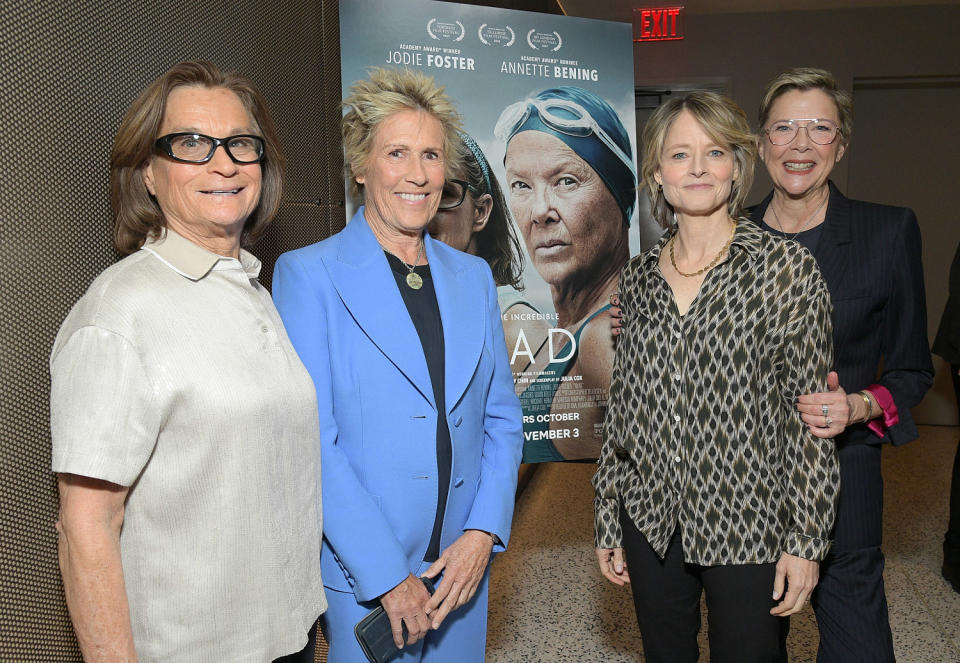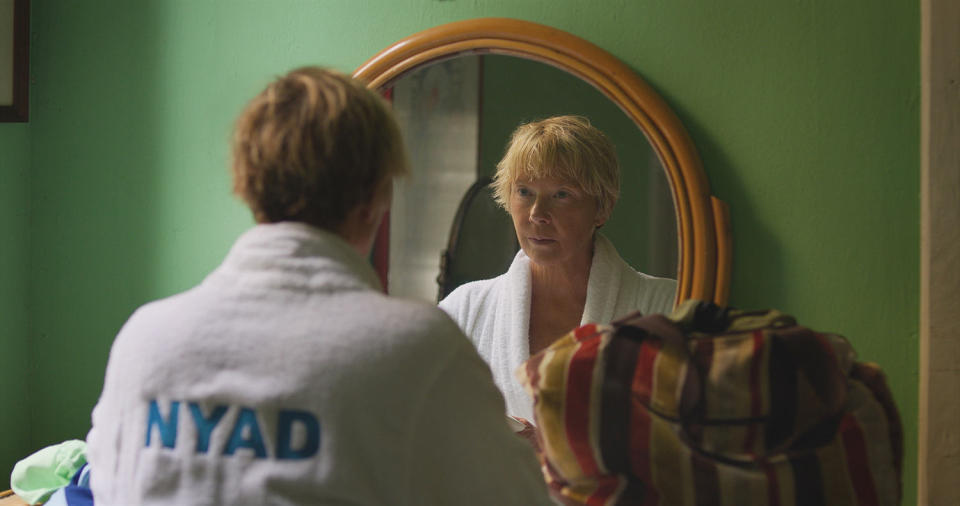The true story behind Diana Nyad's 110-mile, 52-hour Cuba to Florida swim
- Oops!Something went wrong.Please try again later.
Netflix's "Nyad" takes viewers on the inside story of how famed marathon swimmer Diane Nyad swam across the Florida Strait — the waters between Cuba and Key West — at age 64.
The film, based on Nyad's memoir "Find a Way: The Inspiring Story of One Woman’s Pursuit of a Lifelong Dream," stars Annette Bening as the iconic swimmer as she trained to make the 110-mile trek through open waters without a protective shark cage.
Bening told TODAY's Hoda Kotb on Jan. 11 she immediately said yes to the role, despite the mental and physical challenges that would come with portraying a long-distance swimmer in her 60s.
"I read (the script) and was just so taken with Diana and her journey. That just got me in my gut, and I actually didn’t really think it through," Bening said with a laugh. "I just I knew I had to play it. I knew that this was an opportunity like no other and it really proved to be that — but that’s something that I think is good for us, right? A big challenge, something new. Completely took me into world I would never have imagined doing, playing a marathon swimmer."
"I knew that it was a chance to maybe, strip away some layers and dive into something, no pun intended, that was brand new for me," Bening said with a smile.
Read on for the true story that drew Bening to "Nyad," and why the swimmer's journey from Cuba to Florida became controversial in the world of swimming.

How many times did Diane Nyad attempt the swim before she succeeded?
Nyad became a world-renowned swimmer in the 1970s, and made headlines in 1975 at age 25 for setting a world record by swimming around the island of Manhattan in less than eight hours — beating the previous, but unofficial, record by 59 minutes, according to The New York Times.
She then set her goal on becoming the first person to swim straight from Cuba to Florida without a protective shark cage, and made her first attempt in 1978. She swam 68 miles before strong winds forced her to stop, according to a Sports Illustrated article written at the time.
Nyad gave up on her dream until she reached her 60s. Bening told Hoda about why Nyad began exploring the possibility of pursuing the strait again.
"That was what kills me about Diana is that she says, 'Look, I tried to do this swim when I was in my 20s and I failed.' So when she when she reaches 60, she’s at a turning point," Bening said. "She’s been a broadcaster, she’s written books. She’s a really erudite, interesting worldly person, and she just says okay, I’m going to, I have to do this now."
Nyad tried to cross the waters twice in 2011, and again in 2012, according to the BBC, when she failed these attempts due to storms, jellyfish stings and other obstacles.
Bening shared a crucial moment from the film and Nyad's story, when her character’s partner, Bonnie Stoll, portrayed by Jodie Foster, said she thought Nyad was insane for reattempting the swim when she failed to complete it in her 20s.

"That’s what she says in that scene — 'Yeah, but I have this,'" Bening said, pointing to her brain. "'This is what I didn’t have then.' The brain, the life experience, the hutzpah and the ability, the mental ability to really pull this off."
On the morning of Aug. 31, 2013, Nyad began what would become her successful journey across the Florida Strait, escorted by a 35-person team, according to the BBC's reporting at the time.
After about 53 hours of non-stop swimming, she stepped foot on the Florida shore on Sept. 2, 2013, to hundreds of supporters waiting for her arrival, the BBC reported.
Nyad, then 64, told reporters after her swim, according to the BBC: "I have three messages: one is we should never ever give up; two is you are never too old to chase your dreams and three is it looks like a solitary sport but it is a team."
Why did the swim become controversial?
Some experienced marathoners requested more data surrounding the conditions and execution of her 110-mile, 52-hour swim from Cuba to Florida, The Guardian and The New York Times reported at the time, and whether it was "assisted" or "unassisted."
Nyad maintained that she was the first person to have completed the Florida Straits swim unassisted. Marathon swimmers Walter Poenisch and Susan Maroney had previously completed the swim assisted. Poenisch used a shark cage, snorkel and fins; Maroney only a shark cage, per WOWSA.
The World Open Water Swimming Association (WOWSA) defines an "assisted swim" as one in which a "swimmer uses or benefits from any possible number of objects," like shark cages, wetsuits and flotation devices. During unassisted swims, swimmers can have only a swim suit, ear plugs, goggles and a swim cap.
Much of the scrutiny of Nyad’s swim came down to whether she touched the boat or any crew member. Nyad conceded in 2013 she was touched by a crew member when putting on a suit to protect against jellyfish.
A Nyad spokesperson said at the time, per AP in 2013, that Nyad is “committed to complete transparency” and will meet “her peers in the swimming community” to address these criticisms.
Her swim was not ratified by the World of Open Water Swimming. Following the ruling, Guinness World Records no longer recognizes Nyad’s swim as “record-breaking."
WOWSA's advistory board said in a 2023 statement it had decided it would not ratify her swim after "a number of controversies related to the swim were raised and shared publicly by experienced open water swimmers."
WOWSA said, in a statement, that the swim took place "in conformity with rules and procedures ... which did not formally exist at the time of the swim." Further, there were "contradictory statements from crew members" during "critical hours" of the swim.
Nyad has consistently denied the criticism, and told the Times in 2013 the questions surrounding her swim didn't surprise her.
"I’m an absolutely aboveboard person who never cheated on anything in my whole life," Nyad said. "When someone does something they’ve been trying to do for a long time and you know how difficult it is, it’s only logical. I hope they’re not questioning if I’m an honest person."
Nyad also told The Los Angeles Times in 2023 she thought she had submitted all the proof she needed to at the time.
"Maybe I had too much hubris, like, 'I don’t need to prove this to anybody.' That’s my bad. But it wasn’t to obfuscate the rules," she said. "We were never told, 'You’ve got to do this or you won’t be ratified.'"
She questioned WOWSA's decision to Time Magazine in 2023.
“It’s the ultimate absurdity because in 2013, there were no auspices of the sport that performed ratifications,” she says. “They didn’t exist. Our team did what we thought was absolutely fair and square to swim shore to shore never exiting the water, never touching the boat or kayak, never holding on or being propelled forward.”
However, Nyad told the Los Angeles Times that she would accept the swim being classified as assisted.
What have the 'Nyad' directors said about the controversies?
"Nyad" co-directors Jimmy Chin and Elizabeth Chai Vasarhelyi addressed the controversies surrounding Nyad's swim in an interview with Vanity Fair in August 2023.
"As documentary filmmakers, the first thing we did was to look into some of these criticisms — and found that they weren’t valid," Chin said. "When you are at the forefront of your sport, you have a target on your back. Especially if you’re an outspoken athlete like Diana might be considered."
Vasarhelyi added, "I’m just a little tired of the internet trying to tear down a woman who’s complicated and outspoken and owns who she is. We went to great lengths in the film to be able to live up to that. She is a complicated person who has a complicated life."
"We don’t say, 'It’s based on a true story,' we don’t say, 'It is a true story' — but it is a true story. It’s about this idea of truth," Vasarhelyi said.
This article was originally published on TODAY.com

